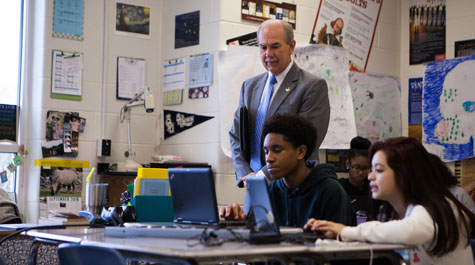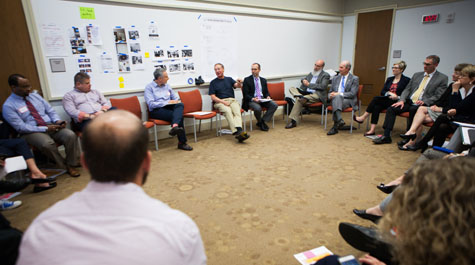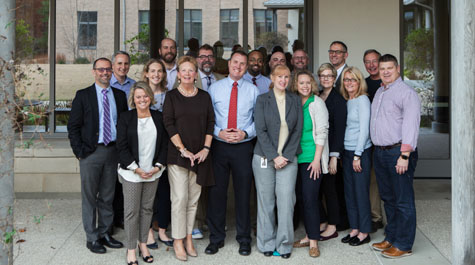VA education leaders visit W&M School of Education to discuss innovation in learning
With help from the William & Mary School of Education, pockets of innovation around the state are rethinking K-12 education and energizing both teachers and students, said Steven Staples ’76, M.Ed. ’83, Virginia superintendent of public instruction, speaking at the School of Education on Nov. 30.
Taken together, these innovations are swinging the pendulum toward a new way of thinking in public education, making Virginia a leader in education innovation, said Staples. Reversing a decades-long trend toward rigid conformity, innovation is largely occurring at the school level, propelled by collaborations among researchers, practitioners and policymakers.
The W&M School of Education hosted a number of Virginia’s education leaders this week to discuss the future of education in the state and see two groundbreaking programs firsthand. Joining Staples were Dietra Trent, Virginia secretary of education; Holly Coy, deputy secretary of education; Olwen Herron, acting superintendent for Williamsburg-James City County; and Ted Dintersmith ’74, education advocate and co-author of the book “Most Likely to Succeed.”
Personalized pathways to student success
The day began with a tour of the Pathways Project, a collaboration between Warhill Hill School and W&M’s Center for Innovation in Learning Design (CILD), which is led by co-directors Mark Hofer, professor of education, and Lindy Johnson, assistant professor of English education. Pathways is offering 100 freshmen at Warhill an alternative curriculum based on personalized, project-based and blended learning experiences.
Warhill’s principal, Jeffrey Carroll, led the group through classrooms buzzing with activity. In Humanities by Design, a cross-disciplinary course merging history and literature within the context of real-world issues, small groups of students scribbled on tables in dry-erase marker as they tracked symbolism and character development in Lord of the Flies.
Teams of students from the Physics by Design course presented their semester-long project designing a roller coaster. Not only had the teams developed engaging, detailed themes for their coasters, they’d performed 11th-grade-level physics calculations of energy, momentum and velocity. One team even demonstrated their fully-functioning model built with K’nex, a toy building set.
As the group of visitors traveled the high school’s hallways, Trent remarked, “This just might be the answer to getting more people interested in education.”
When asked what they like best about their innovative school environment, students pointed to the personalized nature of the curriculum, as well as the opportunity to learn at their own pace. Teacher Brier Anderson added, “It’s not one-size-fits-all; it’s my-class-fits-all.”
Big changes through small steps
Back at William & Mary, the group of education leaders next got a glimpse inside School Retool, another program promoting innovation in schools in Virginia and across the country.
Created by IDEO, a learning design company, and Stanford’s d. school (the institute of design), School Retool is a professional development fellowship program that helps principals develop the vision and mindset to redesign their school culture to include cutting-edge, research-based deeper learning practices.
This fall, the School of Education hosted a Virginia cohort of 20 middle and high school principals from across the state for a series of School Retool sessions. Using the program’s famous “hack mindsets,” principals were encouraged to develop small, scrappy experiments they could implement right away in their schools. Teams, timelines and goals were intentionally kept small, and failures were viewed as opportunities to learn.
During their final meeting of the program on Wednesday, principals presented their “hacks” to the entire group of practitioners, researchers and officials. Following their presentations, the group engaged in a discussion about the future of education in Virginia.
Superintendent Staples encouraged schools to lead through micro-innovations such as the ones the principals had presented. Instead of seeing themselves as passive recipients of policies and mandates, teachers should be empowered to “rethink the box.” And while change is slow, it’s vital to prepare students for the 21st century.
Ted Dintersmith, whose film “Most Likely to Succeed” has been screened in schools and communities across the country, echoed the superintendent’s message. “We owe it to our kids,” he said. “If they invest 13 years in public education, they should get something more out of it.”
The way forward
This fall, Johnson, Hofer and fellow faculty member Meredith Kier, assistant professor of education, have begun to work with teachers and principals from Williamsburg-James City County to expand deeper learning practices across all three high schools in the district through a process of collaborative curriculum design.
Three new classes of students will start in the Pathways Project next fall, with support from the Virginia Department of Education’s High School Innovation Planning Grants. CILD will host a new cohort for School Retool serving both principals and teachers, and Hofer and Johnson have been awarded a grant from the William & Flora Hewlett Foundation to evaluate the impact of the program on participants. Plans are also underway for an Innovation Lab Summer Institute to bring teams of educators together to shift the culture in their schools.
“It’s been an amazing experience working with these ambitious and dedicated teachers to make a difference for their students,” said Hofer.


